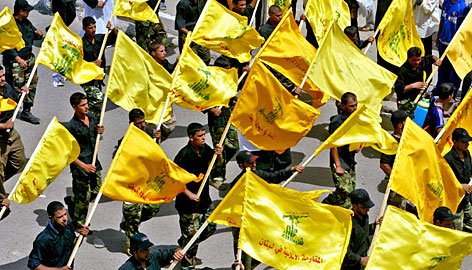We should note that Iran's most significant lever of power is through its support of regional terrorist/political organizations: In Iraq, Al-Sadr and Shiite militias. In Lebanon, Hezbollah. In Palestine, Hamas. Iran's primary polity ally in the region continues to be Syria, which still exercizes great influence over Lebanon. Iran does have long-range missiles, but Israel is their only possible target, and Israel is bristling with anti-missile interceptor technology. Iran can't afford to start an air-war with Israel--the combined Israeli-US air forces are not accessible to Iran by land or sea, and would be able to retaliate--with terrifying effects--mostly unadultered. If Iran was actually going to fire its missiles at Israel, it might have to be prepared to try to invade Iraq.
But Iran's primary lever of power has taken serious blows lately. In Iraq, Al-Sadr and other
 Shiite groups are at peace with the central government after months of raids and negotiations. Iran is trying to rein them in, because it is seeing it is unlikely to win the victory it wants in Iraq, so it is likely taking the victory it can get--a democratic, but Shiite-dominated state. The US and Iran are likely to open diplomatic posts in each others' countries, but mostly as signs of goodwill in their Iraq negotiations. Iraq, believe it or not, is mostly in cleanup-mode at this point.
Shiite groups are at peace with the central government after months of raids and negotiations. Iran is trying to rein them in, because it is seeing it is unlikely to win the victory it wants in Iraq, so it is likely taking the victory it can get--a democratic, but Shiite-dominated state. The US and Iran are likely to open diplomatic posts in each others' countries, but mostly as signs of goodwill in their Iraq negotiations. Iraq, believe it or not, is mostly in cleanup-mode at this point.Syria is primed to jump Iran's ship--its inclusin into Club Med,
 peace talks with Israel, and ambassadorial relationship with Lebanon means it is suddenly reaching in a very pro-West manner, after decades of jihadist rhetoric and isolation, not to mention support of anti-Israeli terror groups and former invasions of Israel. It looks like all of this is about to change. And that means...
peace talks with Israel, and ambassadorial relationship with Lebanon means it is suddenly reaching in a very pro-West manner, after decades of jihadist rhetoric and isolation, not to mention support of anti-Israeli terror groups and former invasions of Israel. It looks like all of this is about to change. And that means...Hezbollah will lose one of its primary benefactors. Syria's lack of cooperation will even make it difficult for Iran to support the southern-Lebanese terror group, and Syrian support for the current Lebanese government will likely decrease the popularity of Hezbollah as a political force.
Syria's recognition of Israel, and peace with it, will strike another blow to the legitimacy of the Hamas terror front's fight for a Palestinian state that replaces the entire Israeli one. The more that the Middle East lines up behind Abbas and the two-state strategy,
 the more hopeless Hamas' political goals will become, and they will be relegated to the realm of extremists in the minds of fellow Muslim Arabs, causing them to lose cash and political support.
the more hopeless Hamas' political goals will become, and they will be relegated to the realm of extremists in the minds of fellow Muslim Arabs, causing them to lose cash and political support.All this means that Iran will have very little to threaten Western interests with, if it all works out. A weak Hamas, Hezbollah, and Iraq Shiite movement will mean it can't threaten to shake up Israel, Lebanon, or Iraq at a moment's notice. Without that power, Western and pro-Western states will raise eyebrows when Iran uses brinksmanship instead of cooperation as its means of convincing other states to do what it wants. This is certainly the "good" scenario of the current situation, but how did we get here?
Bad Cop: Of course, George Bush, doing what he does best, has put a lot of fear into a lot of folks that might otherwise feel comfortable.
 For example: although war with Iran has now become more clearly a psychological tactic to cause the Iranians to lose confidence in their president, this years-long psywar has fooled even the American media into worrying that US troops were about to leap into Iran (even though the military deployment in Iraq and carrier deployment around the world showed no evidence of that ever being the case). Conservatives and moderates in Iran, alike, have started to get very worried bout their president's brinksmanship with an American president known for making quick decisions and sending military forces against good advice. Even now, Israeli planes are flying over the mediterranean and over Iraq, making clear that they are practicing for a strike on Iran. Bush is leading calls for sanctions against Iran in the UN. Bush's hard line against anything resembling terror has lost him respect, but has made those that support terror think twice.
For example: although war with Iran has now become more clearly a psychological tactic to cause the Iranians to lose confidence in their president, this years-long psywar has fooled even the American media into worrying that US troops were about to leap into Iran (even though the military deployment in Iraq and carrier deployment around the world showed no evidence of that ever being the case). Conservatives and moderates in Iran, alike, have started to get very worried bout their president's brinksmanship with an American president known for making quick decisions and sending military forces against good advice. Even now, Israeli planes are flying over the mediterranean and over Iraq, making clear that they are practicing for a strike on Iran. Bush is leading calls for sanctions against Iran in the UN. Bush's hard line against anything resembling terror has lost him respect, but has made those that support terror think twice.Good Cop: Nicholas Sarkozy, great French diplomat, president of the EU. His elaborate diplomatic blitz early in his career patched up relations with the US, UK
 , and Germany in a very short period of time. Even the Russians are a bit warm to him, even if the Chinese aren't. He is now courting the Syrians--who are probably the biggest remaining key to the entire situation in Israel/Lebanon/Palestine--in a truly fantastic, Romanesque way. He has invited them to Club Med, given his support to peace talks with Israel, and even held the Syrian president as a guest of honor at Bastille Day, depsite the fact that this raised a few eyebrows in his own country. Syria is responding well to Sarkozy's courting, and if Syria acts well, the dominoes may begin to fall.
, and Germany in a very short period of time. Even the Russians are a bit warm to him, even if the Chinese aren't. He is now courting the Syrians--who are probably the biggest remaining key to the entire situation in Israel/Lebanon/Palestine--in a truly fantastic, Romanesque way. He has invited them to Club Med, given his support to peace talks with Israel, and even held the Syrian president as a guest of honor at Bastille Day, depsite the fact that this raised a few eyebrows in his own country. Syria is responding well to Sarkozy's courting, and if Syria acts well, the dominoes may begin to fall.Where does Brown fit into all this? By giving his goodwill. The UK's massive military and political power could be put to use here, but they are mostly being kept in check. The UK doesn't want to play bad cop, and can't afford to play good cop due to having so many troops in Iraq. Brown likely gave his permission for Club Med, and is likely exercizing his political strengh to silence people like Merkel, who are most likely to object. The Big Three are working in concert, as they had the potential to as soon as the French and British elections had happened, and each his doing his own part.
Sarkozy's carrots to Bush's sticks are making cooperation a very tempting alternative. One can imagine Assad's eyes light up during his visit to France on Bastille Day, when Sarkozy told him "This is what the cool kids get."



